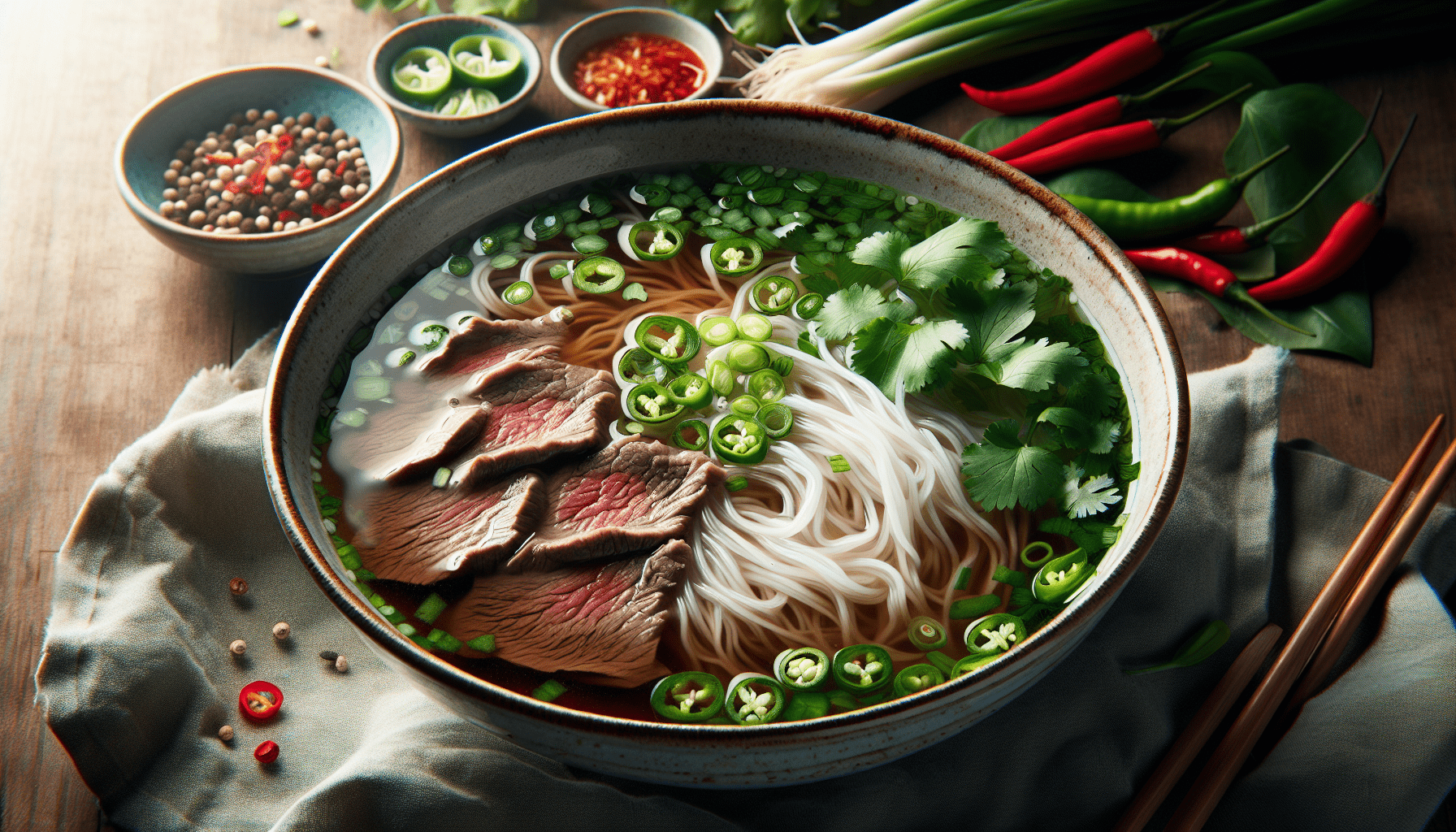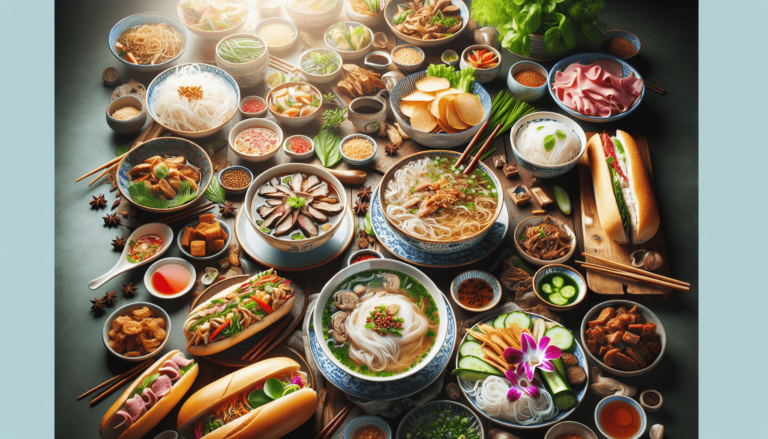Craving a warm and comforting bowl of pho? You’re not alone. But as you sit there, slurping up the fragrant broth and savoring the tender slices of beef and rice noodles, you can’t help but wonder: is pho healthy to eat everyday? Well, worry not, my friend. In this article, we’ll explore the nutritional benefits of this Vietnamese staple and shed some light on whether it’s a wise choice for your daily dining pleasure. So, grab your chopsticks and let’s dig in! And if you find yourself in Pensacola, be sure to check out the Eurasian Bistro locations for a taste of authentic pho.
Understanding Pho: The Vietnamese Staple
Origins of pho and its significance in Vietnamese cuisine
Pho, pronounced “fuh,” is a traditional Vietnamese dish that has gained popularity worldwide. It originated in northern Vietnam in the early 20th century and has since become a staple in Vietnamese cuisine. The dish is typically made with a flavorful beef or chicken broth, rice noodles, and various herbs and toppings. Pho holds a special place in Vietnamese culture and is often enjoyed as a comforting and nourishing meal.
General ingredients and their nutritional profiles
Pho is known for its rich and complex flavors, thanks to the combination of various ingredients. The broth is made by simmering bones, meat, and aromatic spices for several hours, creating a flavorful base. Rice noodles, which form the bulk of the dish, provide a source of carbohydrates. Additionally, pho is often garnished with fresh herbs like cilantro and Thai basil, as well as bean sprouts and lime wedges.
Common variations of pho recipes
While there are countless variations of pho recipes, the two most common types are pho bo (beef pho) and pho ga (chicken pho). Beef pho typically uses beef bones and cuts of meat such as brisket or flank steak, while chicken pho utilizes chicken bones and breast meat. Vegetarian and vegan versions of pho are also available, using vegetable broth and tofu or tempeh as protein substitutes. These variations give individuals with dietary restrictions or preferences the opportunity to enjoy this delicious dish.
Exploring the Nutritional Content of Pho
Macronutrient breakdown: protein, carbs, and fats
Pho provides a well-rounded combination of macronutrients. The protein content primarily comes from the meat used in the broth, such as beef or chicken. The rice noodles contribute to the carbohydrates, while the small amount of fat present in the dish mainly comes from the meat and any added oils used during the cooking process. This balanced macronutrient profile makes pho a filling and satisfying meal option.
Pho’s fiber content and sources
While pho tends to be lower in fiber compared to some other dishes, it still contains a moderate amount. The rice noodles and bean sprouts provide some dietary fiber, although the overall content may vary based on the recipe and serving size. To increase the fiber content of pho, additional vegetables, such as broccoli or bok choy, can be added to the broth.
Vitamins and minerals present in pho
Pho is rich in various vitamins and minerals due to the diverse ingredients used. The broth, made from bones and meat, provides essential minerals like calcium, magnesium, and phosphorus. Additionally, the herbs and vegetables used as garnishes, such as cilantro and bean sprouts, add vitamins A and C to the dish. These vitamins and minerals contribute to overall health and well-being.
Analyzing calorie content
The calorie content of pho can vary depending on the recipe and portion size. On average, a bowl of pho typically contains around 350-450 calories. The calorie content is influenced by factors such as the type and amount of meat used, the ratio of noodles to broth, and the toppings added. Considering the relatively low-calorie count and the nutrient density of pho, it can be a healthy and satisfying choice as part of a balanced diet.

Evaluating Proteins in Pho
The role of protein in overall health
Protein plays a crucial role in supporting overall health and bodily functions. It is essential for building and repairing tissues, producing enzymes and hormones, and maintaining a strong immune system. Including an adequate amount of protein in your diet is crucial for maintaining optimal health.
Sources of protein in pho
Pho offers a good source of protein, primarily derived from the meat used in the broth. Whether it’s beef or chicken, these sources provide essential amino acids necessary for the body’s functions. Plant-based versions of pho, utilizing tofu or tempeh, also offer protein options for vegetarian or vegan individuals. With the variety of protein choices, pho can cater to different dietary needs and preferences.
Understanding the quality of protein in pho
The quality of protein in pho can vary depending on the source. Animal-derived proteins, such as beef or chicken, typically provide a complete range of essential amino acids. Plant-based proteins, on the other hand, may be lacking in certain amino acids but can still be combined with other plant-based protein sources to ensure a complete amino acid profile. By including a variety of protein sources, pho can contribute to a well-rounded and balanced diet.
Sodium Content in Pho
Looking at sodium levels in Pho
Pho can have varying levels of sodium depending on the recipe and preparation. The broth, which forms the base of pho, often contains added salt and seasonings to enhance flavor. Additionally, the use of condiments like fish sauce or hoisin sauce can contribute to the overall sodium content. Monitoring sodium intake is important, especially for individuals with high blood pressure or other health conditions.
Health implications of too much sodium
Consuming excess sodium can have negative health implications, particularly for individuals with certain medical conditions. High sodium intake is associated with an increased risk of hypertension, stroke, and heart disease. It is important to be mindful of sodium consumption and make efforts to manage and reduce it where possible.
Strategies for managing sodium in pho
To reduce sodium content in pho, several strategies can be employed. Opting for low-sodium broth or making homemade broth allows for greater control over the sodium content. Limiting the use of added condiments or choosing low-sodium options can also help reduce sodium intake. Additionally, rinsing bean sprouts or other vegetables removes excess sodium from the dish. These strategies can help individuals better manage their sodium consumption without compromising on the flavors of pho.

Pho and Dietary Fiber
Fiber content in typical pho servings
While pho may not be the richest source of dietary fiber, it still provides a moderate amount. The rice noodles and bean sprouts used in pho contribute to the fiber content of the dish, albeit in relatively small quantities. However, to increase the fiber content, incorporating additional vegetables like broccoli, carrots, or mushrooms can be beneficial.
Health benefits of dietary fiber
Dietary fiber plays a crucial role in maintaining digestive health and overall well-being. It supports regular bowel movements, aids in weight management, and helps control blood sugar levels. Additionally, fiber contributes to a feeling of fullness, which can assist in portion control and preventing overeating.
How pho can contribute to daily fiber intake
While pho may not be the primary source of dietary fiber, it can still contribute to daily fiber intake when paired with other fiber-rich foods. By adding extra vegetables to the broth, individuals can boost the fiber content of their pho. Additionally, pairing pho with a side salad or incorporating other high-fiber options into the meal plan can further enhance overall fiber intake.
Potential Health Benefits of Regular Pho Consumption
Digestive health benefits
Pho, with its warm and soothing broth, can be beneficial for digestion. The broth can help relieve digestive discomfort and promote healthy bowel movements. The inclusion of herbs and spices like ginger and star anise in the broth may also aid in digestion and alleviate gastrointestinal issues.
Investigating its role in weight control
Pho can be a helpful addition to a weight management plan due to its satisfying and nutrient-dense qualities. The broth’s low calorie and fat content, coupled with the protein provided by the meat, can contribute to feelings of fullness and satiety. By including pho as part of a balanced diet, individuals may find it easier to manage their weight effectively.
How it can contribute to a healthy heart
Pho, when prepared with lean protein options and low-sodium broth, can be heart-healthy. The combination of protein, fiber, and vitamins and minerals helps support cardiovascular health. Additionally, the inclusion of herbs and spices in pho may offer potential benefits, as some studies suggest they have anti-inflammatory properties that can protect the heart.
Benefits for the immune system
Pho’s rich and flavorful broth contains vitamins and minerals that can support a healthy immune system. Nutrients such as zinc, iron, and vitamins A and C, found in the ingredients used to make pho, help strengthen the immune system and promote overall wellness. Enjoying pho as part of a varied and balanced diet can contribute to enhanced immune function.
Possible Concerns of Eating Pho Daily
Discussing possible daily sodium overload
While pho can be a nutritious choice, consuming it daily may lead to concerns about sodium intake. It is important to be mindful of the sodium content in the broth and condiments used, especially for individuals with high blood pressure or those advised to limit their sodium intake. Balancing pho with other low-sodium meals and opting for lower-sodium options can help prevent excessive sodium consumption.
Potential weight gain from excessive noodle consumption
As pho is primarily made with rice noodles, consuming it daily in large portions may contribute to weight gain. Rice noodles are a source of carbohydrates, and excessive carbohydrate intake without proper portion control can lead to weight gain over time. Moderation is key, and individuals who are watching their calorie intake should be mindful of portion sizes and balance their pho consumption with other nutrient-dense foods.
Food allergies considerations with pho ingredients
Individuals with food allergies need to be cautious when consuming pho. The broth used in pho often contains fish sauce or other seafood-based products that may trigger allergic reactions in individuals with seafood allergies. Additionally, some individuals may be sensitive to certain herbs or spices used as garnishes in pho. It is important to communicate any allergies or dietary restrictions to ensure safe and enjoyable dining experiences.
Tips for Making Pho Healthier
How to choose leaner protein options
To make pho healthier, selecting leaner protein options can be beneficial. Opting for lean cuts of meat, such as eye of round beef or skinless chicken breast, reduces the fat content of the dish. For vegetarian or vegan individuals, replacing meat with tofu or tempeh provides a plant-based protein alternative. These leaner protein choices can help individuals maintain a balanced and nutritious diet.
Ways to reduce sodium content
Reducing the sodium content in pho can be achieved through various methods. Using low-sodium broth or making homemade broth allows for better control over the sodium levels. Another option is to dilute the broth with water to reduce the overall sodium concentration. Limiting the use of added condiments and opting for low-sodium versions can also significantly reduce the sodium content of the dish.
Including more vegetables for added fiber
To increase the fiber content of pho, individuals can incorporate additional vegetables into the dish. Vegetables like broccoli, bok choy, or bean sprouts not only add fiber but also provide essential vitamins and minerals. Including a variety of colorful vegetables enhances the nutritional value of pho and promotes overall well-being.
Final Verdict: Can We Eat Pho Daily?
When considering whether pho can be eaten daily, it is essential to weigh the pros and cons. Pho offers numerous health benefits, such as supporting digestion, contributing to weight management, promoting heart health, and boosting the immune system. However, potential concerns arise regarding sodium intake, excessive noodle consumption, and individual food allergies. By practicing moderation, opting for healthier ingredient choices, and balancing pho with a variety of nutrient-dense foods, individuals can enjoy pho as part of a balanced diet.
Best Places to Get Healthy Pho
If you’re looking for flavorful yet nutritious pho options, consider visiting Eurasian Bistro locations in Pensacola. Eurasian Bistro offers a range of pho variations made with high-quality ingredients. Their menu includes options for those with dietary restrictions or preferences, ensuring there is something for everyone to enjoy. To find the nearest Eurasian Bistro location in Pensacola, visit their website here. Embark on a culinary journey and savor the delicious and healthy pho dishes prepared by the talented chefs at Eurasian Bistro.







